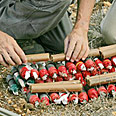
IDF's use of cluster bombs checked
Chief of staff appoints officer holding rank of major general to look into circumstances of incidents in which cluster bombs were fired during Lebanon war. Comprehensive inquiry carried out by head of Ground Forces Division reveals artillery launchers acted against given regulation
The findings of the inquiry were first revealed on Channel 1 Sunday evening.
A cluster bomb is a bomb which contains a large number of small bombs. It explodes on a certain height over the ground and the bomblets inside of it are scattered and explode shortly afterwards. Such bombs cause a great amount of damage.
Sources in the IDF explained that there was no clear instruction not to use these bombs, but that each use requires meeting a long series of criteria in order to cause minimal harm to innocents.
The Israel Air Force did not use these bombs at all, but the inquiry conducted by Brigadier General Ben-Baruch reveals that the artillery launchers' "Destroyer" launcher fired the bombs, apparently acting against given regulations.
The findings were presented to IDF Chief of Staff Dan Halutz and to IDF Judge Advocate General Brigadier General Avi Mandelblit. Following the investigation, Halutz appointed an office holding the rank of major general to look into the circumstances in which the bombs were used.
Beyond the grave aspect of misusing weaponry, the affair testifies to the decision making process in the IDF ranks. Cluster bombs are a sensitive matter, with ramifications that deviate far from the simple military arena, therefore it would seem natural that their use be handled by the Chief of Staff or a representative appointed on his behalf.
IDF sources responded with wonder at the findings. A senior officer said that even without knowing all the exact details, the findings uncover the improper decision making process in the General Staff and its commander.
Cluster bombs were used primarily in the last days of the war. Lebanese reports say that at least 10 civilians were killed from unexploded munitions after the war.
UN: 1 million cluster bombs left in Lebanon
A senior UN official estimated that the defusing of the reported 1 million cluster bombs littered throughout southern Lebanon will be carried out through the end of 2007.
A report from a British organization claims that up to four Lebanese citizens are injured by cluster bombs every day. The organization says aid groups removing the bombs have already cleared 45,000 of them, though hundreds of thousands remain in combat zones.
The report notes that some 40 percent of the cluster bombs did not explode on impact and the duds may detonate from very little contact. The force of the explosion is enough to kill a child says the organization.
Since the ceasefire went into effect on August 14th, UN figures record 20 deaths and 115 injuries, four of the deaths are children under the age of 18, of the wounded some 40 are of the under-18 age group.










